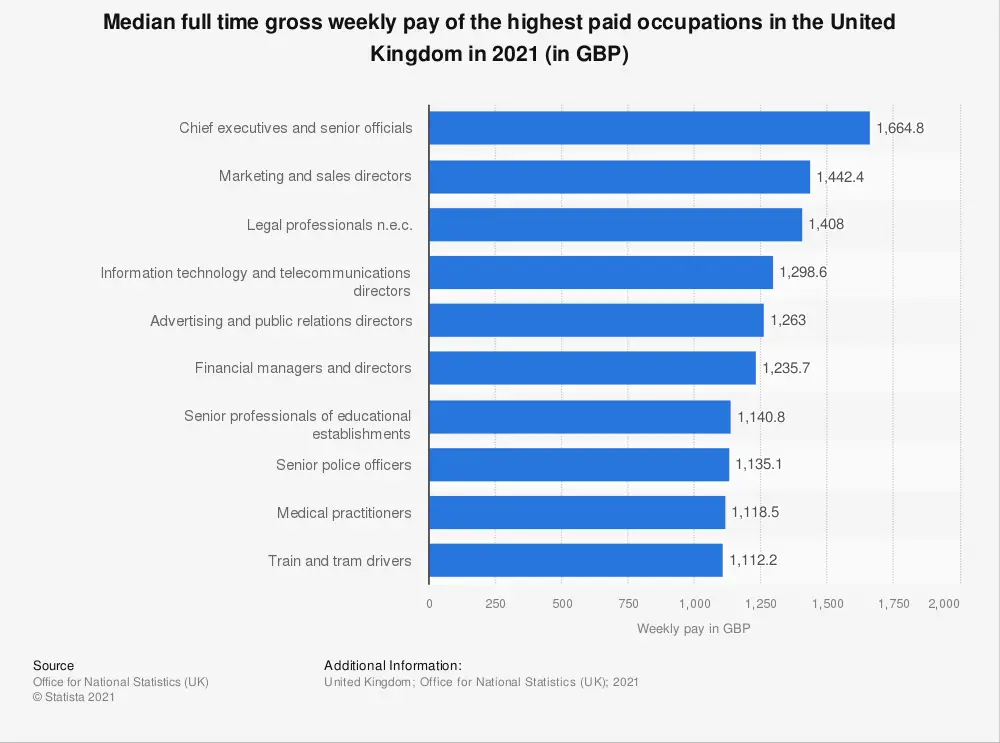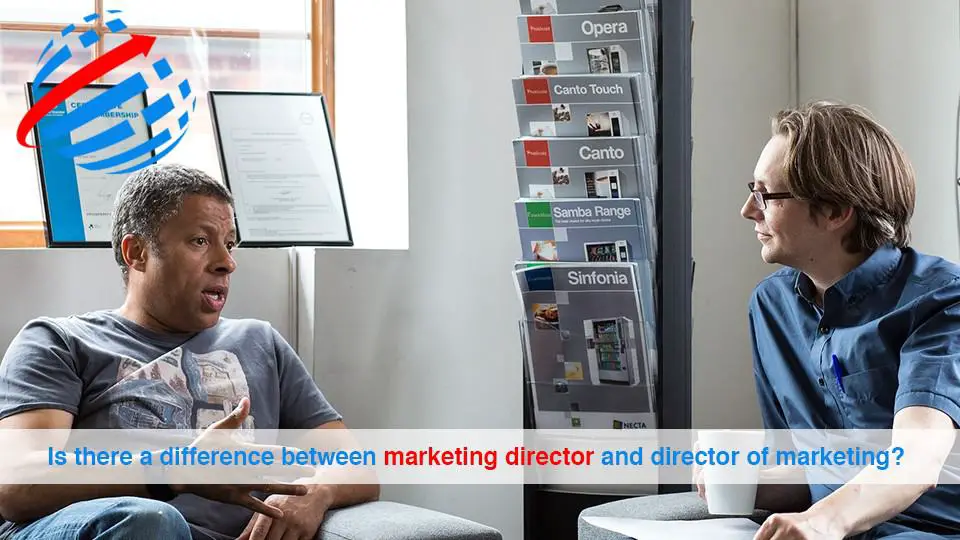Is there a difference between a marketing director and a director of marketing? The answer is yes; there are different definitions for the two titles.
Marketing directors oversee all aspects of marketing, including strategy, customer service, creative development, and other related areas. A Director of Marketing is in charge of managing or overseeing the entire process from start to finish.
The marketing director and the marketing director may have different responsibilities, but they play an essential role in any company.
Marketing directors are responsible for leading the overall branding efforts, while the director of marketing focuses on ensuring that all aspects of a company’s marketing efforts are successful. So what is the difference?
A Director of Marketing usually oversees advertising campaigns and develops ways to attract new customers and retain old ones.
The Director of Marketing also works with other departments to develop effective strategies for web development, social media presence, email newsletters, etc. This will help grow their business and brand awareness accordingly. However, a marketing director focuses more on developing good relationships between stakeholders such as employees or investors by creating positive work environments.
A marketing director’s role is to take data on user purchase habits and combine it with research about the market to create a cohesive presentation of a product.
Brands that have been damaged or are struggling often hire advertising agencies to help them, but the marketing director does the actual work.
Most of their work doesn’t necessarily have to do with ads and television; instead, it focuses strictly on the packaging, placement in stores, event sponsorship, etc., but ultimately having a unified voice and strategy will save time later down the line brands are working together.
Directors of marketing run the marketing division of a company and typically report to the COO or President. Directors are responsible for ensuring all aspects of company-wide marketing function well, including advertising, public relations, events, and social media.
A large portion of a Director’s time is spent on actual marketing projects at clients’ companies. Their work week will vary depending on the size and type of their company – from about 50 hours – 80 hours per week (or more).
A Director primarily acts as an expert advisor to management in determining how best to communicate with clients by analyzing current data practices, formulating short- and long-term strategies, overseeing implementation, and developing plans for changing information technology infrastructure systems.


Looking For Targeted Leads?
Find accurate B2B contact information for targeted marketing. Close more deals and start more conversations.
Where Can I Find A List Of Marketing Directors?
Marketing is the act of reaching out to potential customers and convincing them to buy or do something.
Companies usually have a marketing director that handles all of these efforts, so if you’re looking for someone in charge, this may be your answer!
The company’s website should have contact information for their head honcho – look under “contact” or “careers.” You might also try LinkedIn.com, which has an extensive directory with listings by job title and location.
Although not all of these are marketing directors, a list of over 2900 directors may be able to provide you with the answer you’re looking for.
Marketing directors are responsible for developing and implementing sales strategies to help their company reach its customer acquisition or retention goals.
They can also specialize in media advertising campaigns, research, product branding, and packaging analysis.
Some successful marketers start as copywriters who translate marketing strategy into writing they can use on Facebook or Instagram ads, YouTube videos, or blog posts.
Another way marketers get involved is by running campaign tracking by gathering reports on how people interacted with advertisements so companies can use that data as insight for future ad campaigns.
Is Head Of Marketing The Same As Marketing Director?
It is common for the Head of marketing to be called a “marketing director.” This can lead to confusion, as it’s not always clear what this title means. Is it an interchangeable term? What are the differences between these two titles?
Do you know the difference between a head of marketing and a marketing director?
We’ll take an in-depth look at these two roles to help you understand what each is responsible for, as well as how they differ.
The Head of marketing oversees all aspects of the company’s marketing strategy and implementation, including advertising campaigns, digital media strategy, branding efforts, and customer engagement.
The head marketer typically reports to the CEO or CMO. A key responsibility for this role is setting up budgets for the various departments involved with marketing activities.
A marketing director may have one or more areas that they oversee on behalf of its senior management; however, their primary focus will be on managing individual teams.
To sum up, Marketing Director is a more senior leadership role than the Head of Marketing and falls under the title Vice President.
A head of marketing is a marketing specialist with reports up to the VP level; a marketing director stays below that in an organization’s hierarchy.
Is Head And Director The Same?
Head and director are the same, but they mean something slightly different in specific contexts.
For example, when discussing a company’s hierarchy of management or an office setup head, one can delegate responsibilities among their staff members.
Director often refers to someone specifically responsible for some production field, like a film director or theatrical stage producer.
In some cases, people use Head when referring to themselves, such as when talking about their college major or organizational positions within their organization like Head Coach of _______.
One of the most apparent distinctions is their level of authority. A head typically supervises directors or other high-level positions within an organization while a director oversees lower-level staff members.
The role responsibilities for both parties can include overseeing budgets, managing projects, and leading meetings, to name just a few examples.
However, one significant distinction between these two positions is how they’re compensated: heads typically earn more than directors because they oversee multiple departments simultaneously, whereas directors usually only take charge of one department.
What’s The Difference Between A Digital Marketing Manager And A Head Of Digital Marketing?
The term “digital marketing manager” is a general phrase that encompasses many different roles in the digital marketing world.
A digital marketer’s job can range from managing their company’s social media accounts to being responsible for online advertisements and campaigns.
The difference between a digital marketing manager and ahead of digital marketing usually boils down to who has more control over decision-making. Still, some companies will have both roles to delegate tasks more efficiently.
A Head of Digital Marketing is typically a senior-level executive that makes crucial decisions for tactical execution in the digital marketing space. This person has likely been through all levels of digital marketing, from being knowledgeable about eCommerce to copywriting to design, before becoming Head. They are not focused on product or strategy, but instead, they oversee what work should be done.
A digital marketing manager usually has no outside company responsibilities; they’ll work with their team to create and execute the overall campaign. It’s all about the “in-house” experience here.
They may be in charge of a specific campaign or product group, like social media. Ahead of digital marketing is to have a bigger picture view on marketing operations, looking at revenues for the company as a whole. The big “picture” of sales isn’t just seen inside one department – income relies on other departments.
What Is The Difference Between A Marketing Manager And A Marketing Executive?
Marketing executives are typically responsible for managing the work of marketing managers. This can be challenging because both positions have different responsibilities, and it’s not always clear how to divide them up. Here is a quick rundown on what each part does:
Marketing managers focus on developing strategies, executing tactics, optimizing campaigns, measuring ROI, analyzing data, and managing budgets.
Marketing executives manage teams of marketers to ensure they are meeting their goals and help with strategy development and execution of plans. They oversee everything from customer service to branding efforts.
Companies need to hire people at both levels to miss anything when marketing their company or brand online or offline.
What Is The Difference Between A Digital Marketing Specialist And An Executive?
Digital marketing is an ever-changing landscape. And with more and more marketers being called “digital marketers,” it’s hard to know the difference between a digital marketing specialist and an executive.
A digital marketer can be anyone from a market researcher to someone who writes content or designs ads. On the other hand, the term “executive” typically refers to people in high-level positions such as CEOs or COOs of companies.
It’s essential for business owners to have both types of roles working together because they each bring their own unique skill sets that are crucial for success in today’s world of digital marketing.
What Is The Difference Between A Director Of Marketing And A Director Of Business Development?
As a marketer, you might be wondering the difference between a director of marketing and a director of business development.
A key difference is that while marketing focuses on how to sell products or services, business development focuses on attracting customers. Marketing professionals develop strategies for advertising campaigns and new product launches, whereas Business Development professionals are responsible for generating leads by networking with other businesses in their industry.
The two work closely together as they focus on customer acquisition which is essential to growth and success.
Marketing usually deals with “what to produce,” whereas business development deals more with “how to sell what is produced.”
Director of marketing – Deals primarily with the advertising and marketing strategy, including product promotion, branding, publicity, pricing, and distribution. Represents the company to targeted audiences at conferences or events. Oversees all advertising campaigns and promotional programs like special offers and price reductions; manages any company-owned retail stores.
Director of Business Development – Focuses on cultivating customer relationships by establishing a close understanding of our client’s growing needs to deliver products tailored for their specific market sectors. Oversees longer-term projects related to new business prospecting through lead generation and relationship management activities such as cold calls.
Conclusion
If you’re wondering the difference between marketing and digital marketing, there are several different types of roles.
Marketing directors work to create a strategy for their company’s brands or products. They may also be responsible for overseeing research and development in advertising techniques and measuring performance indicators like ROI (return on investment).
Digital marketers focus on social media platforms, search engine optimization strategies, email campaigns, mobile apps, and more–though they still need to work with other departments within an organization such as sales or customer service to make these efforts successful.
Ahead of digital marketing will oversee all aspects of online presence while a director of business development focuses more broadly across multiple sectors, including IT services or corporate training.
In this blog post, we’ve covered many topics about the difference between a marketing director and ahead of marketing. We hope you find it helpful in determining which position is best suited for your skillset!

Glossary
A senior marketing manager is a person who is in charge of the process, implementation, and management of pricing and promotion analysis. They are responsible for articulating how your product will achieve market penetration through an integrated consumer-facing campaign that explains what makes the company different from potential consumers.
Product Marketing Manager is a type of marketing operation that works on developing and distributing product awareness and educating potential customers about the features and benefits of products. The product marketing manager’s job also promotes their company’s services.
A product manager is responsible for coordinating and managing the cross-functional aspects, from product marketing to engineering. Product management skills encompass everything related to bringing a new product to market. Product managers are experts at understanding customers and their needs, demands, competitors, technology constraints and opportunities, design constraints and opportunities, and figuring out how best to right-size the development effort.
A marketing coordinator, sometimes called a marketer, is a professional who coordinates marketing resources according to the marketing team’s needs. If people are “excellent at getting attention,” then the marketing coordinator should be outstanding at managing brands and putting them in front of potential customers across all forms of advertising!
A sports marketing coordinator handles all the duties in promoting, maintaining, and developing new business opportunities for a company that deals with sporting events.
The advertising manager is a critical player in marketing and is often responsible for overseeing the marketing campaigns. They also work closely with outside agencies, set budgets, assess media plans, report to top executives, and negotiate deals with advertisers.
A brand manager is more involved in marketing and advertising, outward-facing roles. At the same time, content marketers are more engaged with content marketing and creating compelling information for a target audience.
A brand marketing officer implements brand marketing strategies and tactics on behalf of a company’s business to compete in the marketplace. It involves creating or defining consumer needs, wants, and motivations then utilizing techniques such as promotion (advertising), motivational strategy, public relations, event management, and financial-marketing tools to facilitate customer choice for a particular brand.
A brand strategy manager is a person that directs, guides, and develops the strategy for an organization’s services, products, or business segment according to the marketing plan to maximize strategic marketing value. They will ensure that the organization fulfills its objectives by applying branded marketing communications identified from research and development resources while securing stakeholder consensus.
A brand marketing manager is usually part of the top management to oversee a company’s sales and marketing effort directed at a target audience.
Product marketers use their knowledge of how to promote a product by working with the marketing department and others, such as the sales department, design, and engineering. They use their marketing skills to get the word out about a product for customers and generate sales. They can make this marketing effort through offline and online advertising through social media channels like Facebook.
A marketing professional is a person who manages all things marketing. Responsibilities can include planning the promotional mix (the appropriate balance of product, price, place, and promotion), marketing budget, strategy for reaching customer segments, corporate communications, branding research and awareness campaigns, website content development, and management.
A marketing assistant is often an experienced account manager who can be a retained advisor and customer champion for their clients but doesn’t work on a retainer basis.
Inbound marketing is a higher form of content marketing focused on pulling prospects to your site rather than pushing your content out there. It can take some time for inbound marketing to become effective, but it can be worth it in the long run as you target only those interested in what you have to say.



